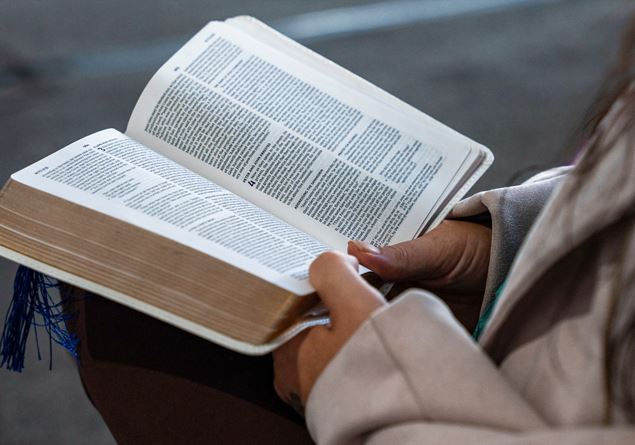The director of SoBiCaIn Don Jose Pottayil, 72 years old
The publication of the Bible in Arabic is due to International Catholic Bible Society (SoBiCaIn)founded by blessed James Alberione one hundred years ago in Alba and approved by the Holy See in 1960. We talked about it with the managing director Don Jose Pottayil.
What is the basic idea that inspired the birth and activity of SoBiCaIn?
«The forerunner of Sobicain is the Pious Society of Saint Jerome for the diffusion of the Holy Gospels. For Don Alberione, founder of the Pauline Family, the motto: “The Gospel in every family” was no longer enough; it was necessary to move on to “The Bible in every family”. Hence the different editions of the sacred text but also the training courses that introduced the reading of the texts and helped to understand them. And also the biblical missions, the publications of commentaries and preparatory texts of various kinds. The languages to which SoBiCaIn has dedicated itself over the years are many: Spanish first and foremost, then Chinese, French, English, Portuguese, but also Tagalog, Cebuano, Illongo, Quichua, Quechua, Guaranì, Bahasa… and, hot off the press, the Arabic version”.
How has SoBiCaIn evolved over the years and how will it operate in the digital world of today and tomorrow?
«If until the Seventies the service to the Word of God – in Italy and in the world – was essentially concentrated on the editorial and training part, subsequently attempts were made to give greater institutional weight to the presences in different parts of the world, with excellent results in nations such as Argentina, Brazil, Colombia, Peru, Venezuela. From the 1990s onwards, attention has shifted to Asia, especially India and the Philippines, with the establishment of Biblical Centers dedicated to training and pastoral initiatives: think of the BibleQuiz in the Philippines and India or the Biblical Festival in Italy. The digital age leads us to think about interactive versions of the Bible, online courses that explore the relationship between the Bible and communication, to enhance new languages and the new way of enjoying content, without however losing the importance of deep reading and not individual of the Word of God.”
In how many countries in the world is it widespread? Where is your base of operations?
«SoBiCaIn is present in all the countries where the Paulines are present. The “real stones” that support the structure of SoBiCaIn are the people, the Paulines passionate about the Word of God. The headquarters are located in Rome, at the General House of the Society of Saint Paul. The Superior General is the president of SoBiCaIn, even if he leads it through his delegate or director who is now me.”
How did the idea of such a large edition of the Bible in Arabic come about, how widespread will it be and will there be problems in distributing it?
«When the Italian version of the Bible. Search the Scripturesa copy was delivered to the Latin Patriarch of Jerusalem, Cardinal Pierbattista Pizzaballa. In fact, one of its priests belongs to the team that directed the work. Appreciating the result, he asked if something similar could be done in Arabic. He spoke about it with the other bishops and they decided to send an official request to the then Superior General of the Society of Saint Paul, Don Valdir José De Castro. Ten other official letters then came to his attention, all with the same request. Don Valdir, responding in the affirmative, asked SoBiCaIn to create everything, possibly before the Jubilee of 2025. And here we are today with the edition now ready. As regards diffusion, there are no problems of an “ideological” nature. Certainly many of the recipients, the Arab Christians, are experiencing a significant moment of trial but this makes the service that SoBiCaIn carries out even more precious and prophetic”.
Were there any previous versions of an Arabic Bible?
«Yes, other editions already exist. This document differs in two fundamental features: the wealth of notes and introductions, which make it unique in its kind; the harmony that characterized the two working groups, one in Lebanon and one in Israel, making available, among other things, a new integral version of the entire New Testament, translated from scratch from Greek to Arabic. The Old Testament instead reproduces the Arabic version from ancient texts (Hebrew and Aramaic) edited by Dar el-Machreq, publishing house of the Lebanese Jesuits”.
What does it tell us about the critical apparatus? Does it differ from the one present in the European language versions, given the different cultural context?
«Certainly there are some adaptations in the notes, but without affecting their message and content. In drafting the notes, the biblical scholars who collaborated kept the texts “open”, drawing on both the Jewish and the patristic traditions, always leaving it up to the Word – and not the biblical scholars who comment on it – to provoke the reader”. Who collaborated with you in the creation of the work? «Behind a work of this kind there would be many names to mention. I mention only two, without whom this edition of the Bible could not have been created: Father Jean Azzam, a Lebanese Maronite biblical scholar who directed the entire work, and Don Francesco Voltaggio, biblical scholar of the Latin Patriarchate of Jerusalem.”
How do you judge the biblical apostolate of the Church today more generally?
«Love for the Word today marks the path of the Church: just think of all the biblical catecheses of Pope Francis, of the institution of the Sunday of the Word of God, of the Month of the Word which is celebrated in September or October in different parts of world. We have certainly also learned a lot from the love for the Word evident in the churches of the Reformation, enriching it on our part with a more ecclesial, community sensitivity. Paraphrasing the passage from the Acts of the Apostles we could say that “where the Word spreads, the number of disciples multiplies”, maturing in faith, hope and charity”.








